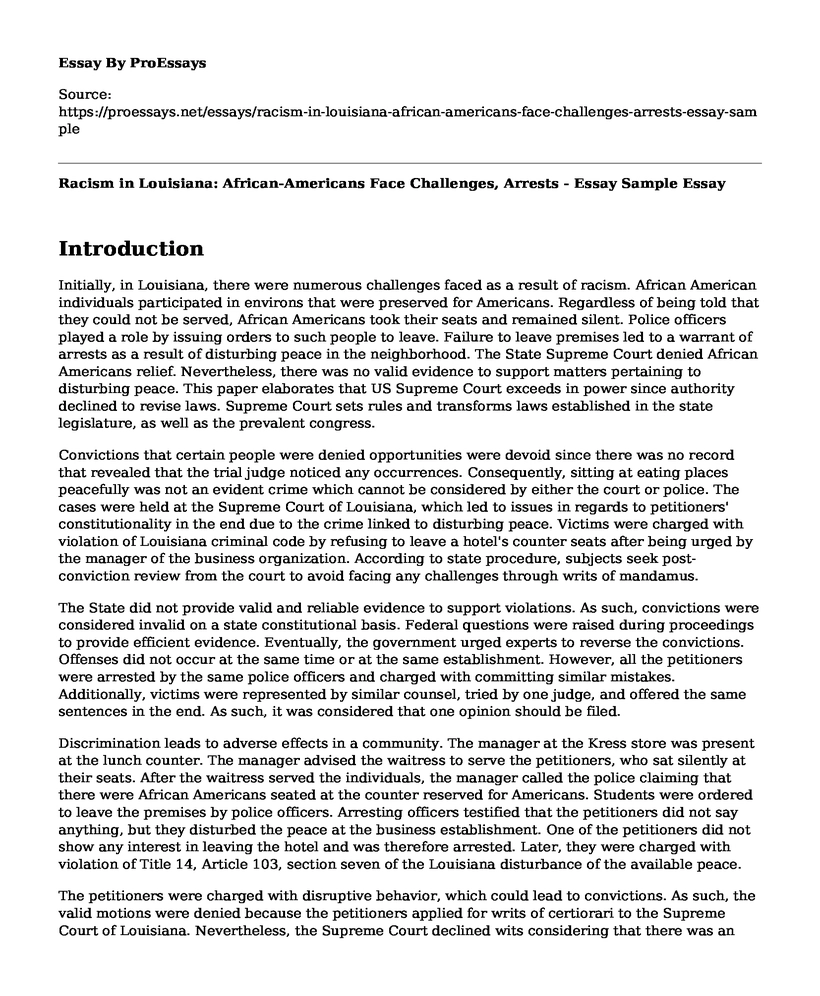Introduction
Initially, in Louisiana, there were numerous challenges faced as a result of racism. African American individuals participated in environs that were preserved for Americans. Regardless of being told that they could not be served, African Americans took their seats and remained silent. Police officers played a role by issuing orders to such people to leave. Failure to leave premises led to a warrant of arrests as a result of disturbing peace in the neighborhood. The State Supreme Court denied African Americans relief. Nevertheless, there was no valid evidence to support matters pertaining to disturbing peace. This paper elaborates that US Supreme Court exceeds in power since authority declined to revise laws. Supreme Court sets rules and transforms laws established in the state legislature, as well as the prevalent congress.
Convictions that certain people were denied opportunities were devoid since there was no record that revealed that the trial judge noticed any occurrences. Consequently, sitting at eating places peacefully was not an evident crime which cannot be considered by either the court or police. The cases were held at the Supreme Court of Louisiana, which led to issues in regards to petitioners' constitutionality in the end due to the crime linked to disturbing peace. Victims were charged with violation of Louisiana criminal code by refusing to leave a hotel's counter seats after being urged by the manager of the business organization. According to state procedure, subjects seek post-conviction review from the court to avoid facing any challenges through writs of mandamus.
The State did not provide valid and reliable evidence to support violations. As such, convictions were considered invalid on a state constitutional basis. Federal questions were raised during proceedings to provide efficient evidence. Eventually, the government urged experts to reverse the convictions. Offenses did not occur at the same time or at the same establishment. However, all the petitioners were arrested by the same police officers and charged with committing similar mistakes. Additionally, victims were represented by similar counsel, tried by one judge, and offered the same sentences in the end. As such, it was considered that one opinion should be filed.
Discrimination leads to adverse effects in a community. The manager at the Kress store was present at the lunch counter. The manager advised the waitress to serve the petitioners, who sat silently at their seats. After the waitress served the individuals, the manager called the police claiming that there were African Americans seated at the counter reserved for Americans. Students were ordered to leave the premises by police officers. Arresting officers testified that the petitioners did not say anything, but they disturbed the peace at the business establishment. One of the petitioners did not show any interest in leaving the hotel and was therefore arrested. Later, they were charged with violation of Title 14, Article 103, section seven of the Louisiana disturbance of the available peace.
The petitioners were charged with disruptive behavior, which could lead to convictions. As such, the valid motions were denied because the petitioners applied for writs of certiorari to the Supreme Court of Louisiana. Nevertheless, the Supreme Court declined wits considering that there was an adequate remedy to solve issues at hand. Victims were tried and convicted and sentenced for four months. However, three months were suspended in regard to a fine of a hundred dollars imposed on subjects. It was evident that there was deprivation of rights due to racial discrimination in the United States. There was criminal conviction without valid evidence; thus, victims faced challenges as a result of deprivation due to the process defined in the Thompson versus the City of Louisville.
The court condemns racial discrimination in society in regard to the administration of state criminal laws. The Bill of rights holds that participation of police, as well as, the judiciary violated the fourteenth amendment. The cases contained private action, which was linked to valid court amendments. The convictions were not linked to sufficient evidence, regardless of causing disturbance of the peace. The evidence does not prove the commission of a crime at the hotel. The charge was not made since there was no evidence to claim convictions. In accordance with the court, criminal trespass was evident after petitioners were arrested sitting peacefully at the cafe counter.
Conclusion
The government should play a role by ensuring that all citizens are treated equally regardless of any differences. On the other hand, practitioners, such as judges, should ensure that there is valid evidence presented before the court before convicting victims. It is evident that there are numerous people that are convicted innocently. Racism hinders growth and development in the nation since the economic status is affected negatively in the end. Authority should create awareness through televisions, radio, and social media to ensure that information reaches citizens within the required timeframe without facing any challenges. Convictions made in regards to issues faced at the cafe counter were considered devoid according to the available evidentiary support as a result of the Due Process Clause entailed in the Fourteenth amendment. There was no record to indicate reliable evidence.
Cite this page
Racism in Louisiana: African-Americans Face Challenges, Arrests - Essay Sample. (2023, Mar 14). Retrieved from https://proessays.net/essays/racism-in-louisiana-african-americans-face-challenges-arrests-essay-sample
If you are the original author of this essay and no longer wish to have it published on the ProEssays website, please click below to request its removal:
- A Critical Review of Doing Intersectionality Repertoires of Feminist Practices in France and Canada
- Cleaning: The Final Feminist Frontier Rhetorical Analysis
- Sociology Essay Example: What Poverty Means
- Paper Example on Victim-Blaming: Breaking the Silence on Sexual Harassment & Rape
- Essay Example on Immigration: A Crucial Debate for Building Nations
- Literary Analysis Essay on "Wide Sargasso Sea" and "A Room of One's Own"
- Immigrant Women's Dangers: Domestic Violence, Language Barriers, Cultural Differences - Essay Sample







